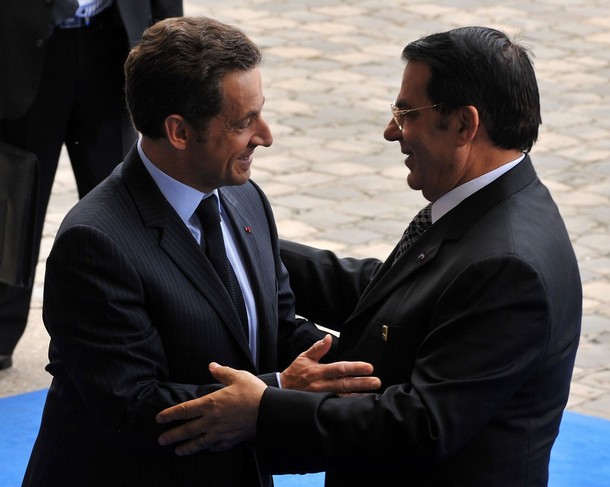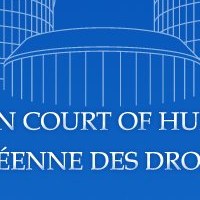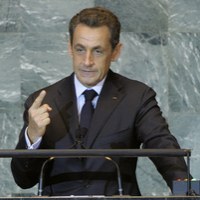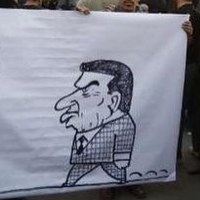![]()
Wed, Jan 19, 2011 | WikiLeaks | the Guardian

France's President Nicolas Sarkozy (L) welcomes Tunisia's President Zine el abudube Ben Ali as he arrives to attend the Paris' Union for the Mediterranean founding summit, on July 13, 2008 at the Grand Palais in Paris. French President Nicolas Sarkozy and 42 leaders launched a union between Europe and its Mediterranean neighbours but tensions among Middle East countries could undermine the grand plan. (Photo: DOMINIQUE FAGET/AFP/Getty Images)
WikiLeaks: France Under Fire over Support for Tunisia
Nicolas Sarkozy accused of ignoring weeks of Tunisian protests and being too close to unpopular Ben Ali regime.
The French president, Nicolas Sarkozy, was accused Monday of tacitly propping up dictatorship in north Africa and of botched diplomacy in France’s ambivalent response to the tumults in Tunis, according to a report by the British newspaper the Guardian.
Analysts, EU diplomats and French opposition figures said the Sarkozy administration, following years of close relations with the Ben Ali regime in Tunisia, had been caught napping by the “jasmine revolution” despite weeks of protests in the former French colony and the extensive and intimate human, business, and political links between France and Tunisia.
“Overall the French have been agnostic, along the lines of ‘better the dictator you know than the dictator you don’t,'” said an EU official.
“We really have a diplomacy without courage and without dignity. I am ashamed of what I have seen,” said the opposition former cabinet minister Pierre Moscovici.
Three days before the Tunisian dictator fled to Saudi Arabia on Friday, the French foreign minister, Michèle Alliot-Marie, outraged liberals and human rights activists by proposing to dispatch French security forces to Tunis to shore up the unpopular regime.
Since the weekend denouement in Tunis, French leaders have been scrambling to save face and sound tough. Alliot-Marie sought to backtrack yesterday on her offer of security forces, while repeatedly stressing that French policy was one of non-interference in the affairs of sovereign states.
This, despite the fact that her predecessor as foreign minister, Bernard Kouchner, was the architect of a policy of humanitarian intervention to try to prevent violence by despots against rebellious people.
Paris’s record of support for the ousted Tunisian regime is longstanding, predates Sarkozy and has been shared by leading opposition figures.
Following an attack on a French journalist by regime thugs in 2005, the US embassy in Tunis reported on the French government’s response.
“We view this controversy as indicative of the degree to which President [Jacques] Chirac’s ‘stability first’ and tradition of cultivating close relations with ageing Arab world dictators is increasingly out of step with current realities and prevailing media opinion in France,” the cable, released by Wikileaks, reported.
Sarkozy was made an honorary citizen in Tunis in 2008 and praised the Ben Ali government for expanding liberties in Tunisia. His culture minister, Frédéric Mitterrand, reported by the French media to have had Tunisian citizenship conferred on him by Ben Ali, said last week that Tunisia was being unfairly criticised: “To say that Tunisia is a one-man dictatorship seems to me quite exaggerated.”
Read related article in the Guardian “Tunisian protests have caught Nicolas Sarkozy off guard, say opposition” here.
Source: WikiLeaks
Cable dated:2005-11-16T09:53:00
C O N F I D E N T I A L SECTION 01 OF 02 PARIS 007777
SIPDIS
E.O. 12958: DECL: 11/7/2015
TAGS: PREL, PHUM, KDEM, TS, FR”>FR
SUBJECT: ASSAULT OF FRENCH JOURNALIST IN TUNISIA PROMPTS MEDIA OUTCRY, DOMESTIC CRITICISM OF GOF HUMAN RIGHTS POLICY
REF: 03 PARIS 8954Classified By: Political Minister-Counselor Josiah Rosenblatt, reasons 1.4 (b) and (d).
1. (C) Summary: The November 11 assault of a French journalist in Tunis by unknown assailants widely believed to belong to the Tunisian security services has prompted an outcry among French media, which has harshly criticized GoF complacency on Tunisia’s human rights situation, with some leading dailies and opposition politicians calling for the France to boycott the World Summit for the Information Society (WSIS). The GoF response, meanwhile, has been limited to cautious MFA statements calling for the Tunisian government to shed light on the attack and respect freedom of information. MFA contacts confirmed that the controversy will not result in a GoF boycott of the WSIS, though the GoF delegation head, currently Finance Minister Breton, may be downgraded to a junior minister level, depending on the degree to which the issue continues to generate domestic controversy. MFA contacts privately expressed pessimism on prospects for improvement in Tunisia’s human rights situation in the wake of the WSIS, and were similarly negative on the likelihood of France taking a tougher stance on Tunisian human rights, as long as Chirac remains president. End summary.
2. (SBU) French media continues to report widely on the attack on “Liberation” correspondent Christophe Boltanksi, who was beaten and stabbed by four unknown assailants late November 11 in Tunis, after having extensively reported on human rights abuses on the eve of the GOT-hosted WSIS. Several French newspapers, led by “Liberation,” have suggested that Boltanski’s attack was perpetrated by Tunisian security services, though the identities of the attackers remain unknown and there is no definitive evidence. Boltanski, who did not require hospitalization and returned to France shortly after the attack, declared in press remarks that his attackers took their time, stole his bag containing interview notes, and were not stopped by the very heavy police presence in the diplomatic quarter where the attack took place. Boltanksi dismissed the likelihood that the attack was criminally motivated, noting that foreign journalists in Tunisia are heavily monitored and that human rights activists in Tunisia have faced similar attacks from plain-clothes Tunisian security service officials. Follow-up incidents of alleged GOT harassment of Belgian and Swiss journalists and a French “TV 5” news crew in Tunis continued to attract heavy French media coverage November 16.
3. (SBU) In a November 13 statement issued some 40 hours after the Boltanski assault took place, the MFA declared, “We have made it known to the Tunisian authorities, in Paris and in Tunis, that we are counting on them to shed all light possible on the attack…” In a follow-up statement November 15, FM Douste-Blazy called on the GOT to respect freedom of information and not impede the work of journalists attending the WSIS, without protesting the Boltanski assault. “Liberation” November 14 decried the GoF’s belated and mild reaction to the Boltanski attack and recurring human rights abuses in Tunisia, which it ascribed to longtime complacency by President Chirac towards the human rights situation in Tunisia, as a means of protecting French commercial and strategic interests there. “Liberation” and several other French dailies cited Chirac’s widely reported comments during a December 2003 visit to Tunisia (reftel), in which he dismissed the concerns of protesting civil society activists in Tunisia and described the right to food as paramount above political liberties. “Liberation” concluded that the French president had shown himself to be closer to Moscow and Havana on human rights issues, than fellow Western democracies. A November 15 “Le Monde” editorial went further in making unfavorable comparisons between French and U.S. policy towards Tunisia, noting that the U.S. had not hesitated to call publicly for Tunisia to pursue political and human rights reforms, while France “did not have such courage.” The “Le Monde” editorial concluded by calling on France to abstain from attending the WSIS, or, at minimum, to pressure Tunisia via the EU to comply with its EU association agreement obligations, which remained a “dead letter.” Leaders of the opposition French Socialist party (PS) echoed the call for a WSIS boycott and called on the GoF to issue an “official protest” of the Boltanski assault.
4. (C) XXXXXXXXXXXX told usXXXXXXXXXXXX that the Boltanski attack would not affect GoF participation in the WSIS, for which Minister of Economy/Finance Thierry Breton would lead the French delegation. In a follow-up discussion XXXXXXXXXXXX was more cautious, and noted that the degree of French media attention on the attack and consequent criticism of GoF human rights policy was unprecedented. While XXXXXXXXXXXX affirmed that a GoF boycott of the WSIS was out of the question, he conceded that there was a slim possibility that the delegation head might be downgraded to the junior minister level, depending on the degree to which the issue continued to generate controversy, especially during the weekly audience by FM Douste-Blazy before the National Assembly foreign relations committee November 15. XXXXXXXXXXXX commented that the GoT had viewed the GoF decision to send Breton to the WSIS as an “insult,” given that the French PM had attended the first WSIS summit and that Tunis had lobbied unsuccessfully for Chirac’s attendance.
5. (C) XXXXXXXXXXXX remained skeptical on prospects for finding Boltanski’s attackers or for any near-term improvement in Tunisia’s human rights situation in the aftermath of the WSIS. While noting there was no evidence of GoT involvement in the Boltanski assault, he mused that the GoT was effective in covering up such matters. XXXXXXXXXXXX speculated that the modest gestures which Tunisia had made in the run-up to the WSIS — allowing access to banned websites, for instance — would evaporate as soon as the WSIS had ended, with the GoT likely to crack down on the hunger strikers as well. Pressed for details on how the GoF was articulating its human rights concerns to the GOT, XXXXXXXXXXXX offered few details. He noted that the French embassy in Tunis, for the first time, had received a representative of the eight hunger strikers November 14, though the GoF had opted not to send any emboffs to meet the hunger strikers themselves, which he said would cross a “red line” for the GoF and provoke a crisis with the GoT. Explaining the degree to which the GoF sought to accommodate the GoT on human rights concerns, XXXXXXXXXXXX noted that when French FM Douste-Blazy met with representatives of the Tunisian League of Human Rights (LTDH) during a visit to Tunis last October, the French MFA received a delegation of pro-GOT LTDH members, as a quid pro quo requested by the GOT.
6. (C) Pressed to explain why the GoF could not speak more forcefully with Tunisia on human rights, given the friendship between the two countries, XXXXXXXXXXXX commented that “everyone” in the MFA wanted to see the GoF take a more activist stance on political repression in Tunisia, which was entirely without justification, as a political opening posed no risk to the stability of the GoT. On the contrary, continued suppression of basic political liberties by the GoT, out of step with Tunisia’s economic success and educated population, could spell trouble for Tunisia’s long-term stability and open the door to Islamist influence. XXXXXXXXXXXX concluded, though, that, despite media criticism and the preferences of working level MFA officials, GoF human rights policy on Tunisia would remain unchanged as long as Chirac remained President. In XXXXXXXXXXXX’s view, the French leader’s ties with Ben Ali were too long-standing for the French president to adopt a new approach.
7. (C) Comment: We view this controversy as indicative of the degree to which President Chirac’s “stability first” and tradition of cultivating close relations with aging Arab world dictators is increasingly out of step with current realities and prevailing media opinion in France. While the media focus on the Boltanski attack may subside in coming days, we expect that the GoF will remain vulnerable to further domestic criticism for inaction on human rights issues in Tunisia — as the MFA speculated, as long as Chirac remains president. End comment. Please visit Paris’ Classified Website at: http://www.state.sgov.gov/p/eur/paris/index.c fm
Hofmann



 RSS
RSS











#WikiLeaks: #France Under Fire over Support for #Tunisia | #Sarkozy #BenAli #Jasmine #Revolution http://j.mp/ge1EbI
RT @CrethiPlethi: #WikiLeaks: #France Under Fire over Support for #Tunisia | #Sarkozy #BenAli #Jasmine #Revolution http://j.mp/ge1EbI